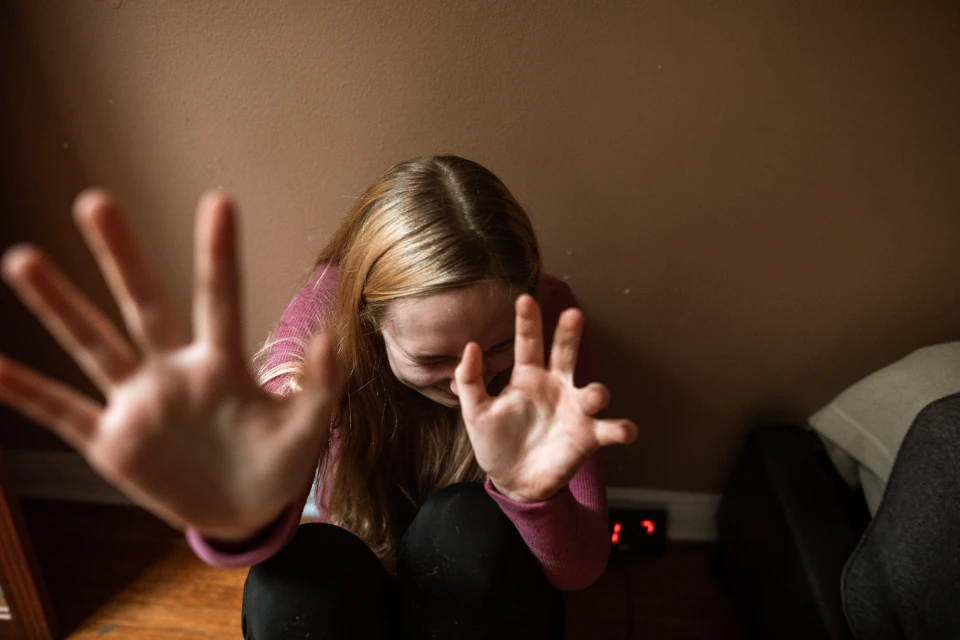Emotional trauma can occur when a person experiences or witnesses an intensely distressing or disturbing event. Traumatic experiences like abuse, violence, disasters, accidents, or significant losses can have profound psychological and physiological effects, even long after the traumatic incident has passed.
In the United States, it is estimated that around 6.3% of adults will experience post-traumatic stress disorder (PTSD) in their lifetimes due to emotional trauma.
Many more struggle with other trauma-related conditions like depression and anxiety disorders. When trauma goes unresolved, it can continue to impact mental health and quality of life for years negatively.
Recognizing the common signs of emotional trauma in adults is essential for several reasons. Being aware of potential trauma symptoms enables individuals to seek help when needed.
Specific behavioral patterns or emotional changes may signal underlying trauma that requires professional treatment. Identifying trauma-related issues early on can prevent them from progressing into long-term mental health problems.
Friends and family members can also provide better support when they understand telltale trauma indicators to look out for in loved ones.
Overall, familiarity with typical manifestations of adult trauma empowers both individuals and their support networks to take proactive steps toward healing.
As trauma experts highlight, the path of recovering from painful experiences begins with acknowledging their impacts in the first place.
Understanding the Basic Concept of Emotional Trauma
Emotional trauma refers to the psychological, emotional, and physiological impacts that arise from experiencing or witnessing an intensely distressing event.
The traumatic experience overwhelms the individual’s ability to cope and causes feelings of helplessness and lack of control. Trauma expert Dr. Jon Caldwell describes emotional trauma as occurring when internal resources are inadequate to deal with external stressors.
Different types of events can lead to emotional trauma if an individual finds them profoundly disturbing or frightening.
Traumatic events often involve a threat to life or safety but could also entail the loss of a loved one, especially in sudden or violent circumstances. Some examples of potentially traumatic events include:
- Natural disasters like earthquakes, floods, fires
- Serious accidents, such as car crashes
- Physical or sexual abuse and assault
- Domestic violence
- Childhood emotional abuse or neglect
- Exposure to community violence, terrorism, or war
- Unexpected death or suicide of a loved one
In other cases, emotional trauma may stem from chronic stressful experiences that persist over extended periods, such as:
- Ongoing physical, emotional, or sexual abuse
- Chronic domestic violence
- Long-term bullying or harassment
- Living in dangerous conditions like war zones or conflict areas
- Serious, life-threatening illness
Whether a single incident or ongoing stressors, these events can overwhelm an individual’s ability to cope and create a sense of fear, hopelessness, and a lack of safety. This distinguishes trauma from more mundane stressors.
Trauma can additionally be categorized as acute or chronic. Acute trauma refers to a single traumatic event with distinct beginning and endpoints. In contrast, chronic trauma describes repeated or prolonged traumatic exposures that create cumulative emotional damage over time.
Professionals like licensed clinician Scott Michael note that long-term, chronic trauma often has more pervasive psychological impacts compared to single-event trauma. Both types of trauma significantly impact mental health and functioning.
Common Psychological and Emotional Signs of Trauma in Adults
Identifying the signs of emotional trauma in adults is a crucial step toward understanding the complex impacts of psychological distress. Whether it’s small changes in behavior or strong feelings, noticing these signs is a big help in getting people the proper support and help. Let’s read them thoroughly:
Anxiety and Panic Attacks
Anxiety is a very common psychological reaction to emotional trauma. Traumatic experiences create a sense of uncertainty and lack of safety that can manifest as ongoing feelings of anxiety and hypervigilance. Adults dealing with unresolved trauma may struggle with the following:
- Generalized anxiety and constant worrying
- Social anxiety and avoidance of interpersonal interactions
- Specific phobias about places or objects related to the trauma
- Panic attacks when reminded of the traumatic event
Panic attacks can be particularly debilitating, coming on suddenly and featuring physical symptoms like rapid heart rate, dizziness, shortness of breath, and sweating. These symptoms may make individuals feel as if they are reliving the trauma or in imminent danger.
Depression, Sadness, and Hopelessness
Experiencing a traumatic event, especially when severe or fatalities are involved, often leads to grief and depressive symptoms. Signs of trauma-related depression in adults can include:
- Persistent sad, empty, or numb mood
- Tearfulness and despair
- Lack of energy and constant fatigue
- Sleep disturbances and appetite changes
- Loss of interest in normally enjoyable activities
- Feelings of worthlessness and hopelessness
- Impaired concentration and difficulty making decisions
- Thoughts of death or suicide
These depression indicators can be chronic or occur in response to reminders of the trauma. Ongoing feelings of sorrow, hopelessness, and despair are common emotional manifestations of unresolved trauma.
Emotional Detachment and Dissociation
Some adults cope with traumatic memories and emotions through emotional numbing and dissociation. This involves disconnecting from parts of their experience and emotions. Signs of dissociation can include:
- Feeling detached from oneself or body
- Difficulty recalling details of the trauma
- Emotional numbness and restricted affect
- A sense of unreality about oneself or the world
- Becoming non-communicative during reminders of the trauma
Chronic emotional detachment impairs relationships and daily functioning. Though intended as a coping mechanism, dissociation prevents individuals from fully processing and healing from the trauma.
Mood Instability, Irritability, and Anger
Trauma often leads to ongoing problems regulating emotions. Adults may exhibit marked shifts between depression, anxiety, detachment, and anger. Signs of mood instability can include:
- High irritability and tendency to lash out
- Difficulty calming down once upset
- Extreme mood swings between sadness and agitation
- Heightened emotional reactivity in response to stressors
- Expressions of anger or rage with little provocation
Such mood instability reflects the psychological damage caused by trauma and the inability to return to emotional equilibrium. Rage and anger are common responses to traumatic loss of control.
Feelings of Shame and Guilt
Traumatic events frequently generate unwarranted feelings of shame, self-blame, and guilt. Many survivors irrationally take responsibility for what happened or believe they could have done more to prevent it.
They may convince themselves that had they behaved differently, the trauma would not have occurred. Signs of trauma-related guilt include:
- Harsh self-criticism and negative self-talk
- Preoccupation with perceived mistakes related to the trauma
- Severe feelings of inadequacy, shame, and self-blame
- Belief that one deserved or somehow caused the trauma
These irrational beliefs maintain trauma’s grip by distorting the individual’s self-perception and impairing their ability to make sense of what happened.
Difficulty Regulating Emotions
Adaptively managing emotions often becomes difficult after trauma. Adults may exhibit:
- Overreactions to minor frustrations or disappointments
- Difficulty calming down once emotionally upset
- Outbursts of anger, sadness, or anxiety with little warning
- Turning to unhealthy coping mechanisms like substance abuse
Such signs reflect the lingering effects of trauma on the nervous system and its ability to self-regulate. Skills learned in therapy can help individuals expand their emotion regulation capacities.

Post-Traumatic Stress Disorder Symptoms
Post-traumatic stress disorder (PTSD) represents the most severe manifestation of trauma. While not all trauma survivors develop PTSD, its symptoms are common emotional responses. These include:
- Intrusive memories of the trauma through flashbacks or nightmares
- Avoidance of associated places, objects, people, or internal reminders
- Negative alterations in mood and cognition
- Feeling jumpy, on edge, or easily startled
- Reactivity to trauma triggers and loss of emotional control
PTSD develops when the nervous system remains fixated on the trauma, unable to integrate it as a past event. When present, PTSD symptoms indicate severe trauma requiring professional help to resolve.
Physical Manifestations of Emotional Trauma in Adults
Physical signs of emotional trauma in adults can show up in various ways, revealing the profound impact on their bodies. From headaches to changes in sleep, these signs give clues about how trauma affects adults physically. Let’s explore these signs further to understand better.
Headaches and Stomach Issues
Emotional trauma can manifest physically in a variety of ways. Adults may develop frequent headaches like migraines or tension headaches when struggling with unresolved trauma.
Digestive issues like stomachaches, nausea, vomiting, constipation, or diarrhea are also common somatic complaints related to trauma. These physical symptoms are the body’s way of expressing emotional distress when psychological pain remains unaddressed.
Appetite and Weight Changes
Traumatic experiences often disrupt standard eating patterns. Some individuals lose interest in food and lose significant weight when depressed or anxious after trauma.
Others may overeat and gain weight as a coping mechanism. Erratic eating behaviors and pronounced fluctuations in weight can indicate underlying trauma impacting mental health.
Fatigue, Low Energy, and Exhaustion
Trauma frequently leads to chronic exhaustion, an absence of energy, and feelings of lethargy. Adults may rely on stimulants like caffeine just to get through each day. Difficulty both falling and staying asleep often compounds this fatigue.
Ongoing tiredness prevents optimal functioning and is a warning sign that trauma requires resolution. Restoring healthy sleep can be an essential part of recovering from emotional trauma.
Insomnia and Sleep Disruptions
Insomnia is one of the most common yet overlooked manifestations of trauma. Trauma survivors often experience:
- Difficulty falling or staying asleep
- Frequent nighttime awakenings
- Nightmares related to the trauma
- Panic attacks that disrupt sleep
Sleep struggles leave individuals feeling exhausted. Lack of quality sleep also impairs concentration, cognition, mood stability, and physical health. Prioritizing restful sleep is crucial when healing from trauma. Effective treatment targets nightmares and panic attacks to restore needed sleep.
Elevated Heart Rate and Blood Pressure
Trauma impacts cardiovascular functioning as well. Adults may suffer from excessive stimulation of the sympathetic nervous system. This results in elevated resting heart rate and blood pressure.
Additionally, heart rate and blood pressure spike in response to potential trauma reminders. If left unchecked, these cardiovascular effects increase the risk of heart attack and stroke. Therapy and stress reduction help stabilize these irregular trauma responses.
Muscle Tension and Body Aches
The body often carries physical tension related to trauma. This can include tight, painful muscles and body aches without a clear cause. Tension commonly builds up in the back, neck, shoulders, and abdominals when individuals feel stressed and on edge from trauma.
Chronic muscle tension also frequently leads to painful headaches. Massage, warm baths, and relaxation practices can help relieve this physical tension.
Cognitive and Behavioral Signs of Emotional Trauma in Adults
Discovering how emotional trauma affects thinking and behavior is essential in understanding and aiding adults in their recovery journey. Let’s explore these cognitive and behavioral signs to offer vital guidance in support and healing.
Concentration and Memory Difficulties
Traumatic experiences often impair attention, focus, and memory. Adults struggling with unresolved trauma may exhibit the following:
- Lack of concentration that disrupts work or school
- Forgetfulness and struggles recalling details
- Difficulty learning or retaining new information
- Confusion, haziness, and distorted memory
- Dissociative amnesia surrounding the trauma
Everyday cognitive functions become compromised when trauma dominates mental resources. Supportive psychotherapy can help reinforce cognitive skills weakened by trauma.

Avoidance and Withdrawal
Avoiding potential reminders of the trauma is a common reaction. Adults may withdraw from specific people, places, situations, or activities tied to the traumatic event. General social isolation and reluctance to leave home can also occur.
Avoidance provides temporary relief but prevents the trauma from being fully processed. Gradual exposure treatment helps overcome this learned avoidance.
Hypervigilance and Feeling Easily Startled
Traumatized individuals often feel on guard and unsafe, even when no real threat exists. Signs of hypervigilance include:
- Feeling constantly on edge
- Quickly startled by noises or unexpected touch
- Restlessness and inability to relax
- Obsessive worry about potential dangers
- Panic attacks when caught off guard
This persistent state of anxiety and protectiveness stems from the nervous system remaining fixed on the past trauma. Therapy can help restore a sense of security in the present.
Risky Behaviors and Increased Substance Abuse
Unhealthy ways of coping with trauma may emerge. Some engage in dangerous or thrill-seeking behaviors to feel in control or numb their distress. Increased use of drugs, alcohol, smoking, eating disorders, and other addictive behaviors often serve to self-medicate trauma symptoms as well.
However, these outlets provide only temporary relief and cause more life problems. Addressing the root trauma is key to changing such harmful behaviors.
Isolation and Relationship Conflicts
The effects of trauma frequently spill over into relationships. Adults may:
- Withdraw from family or friends
- Lose interest in intimacy or isolate themselves
- Have increased arguments or emotional outbursts
- Struggle with trusting others or being vulnerable
Trauma strains relationships when individuals feel unable to connect. Counselling helps identify relationship patterns stemming from trauma experiences so they can be overcome.
Loss of Interest in Regular Activities
Diminished interest or pleasure in previously enjoyed activities is a common sign of trauma-related depression. Adults may:
- Abandon hobbies or sports they used to enjoy
- Stop participating in social activities
- Call out of work or school persistently
- Become generally apathetic about interests that once brought joy
Re-engaging trauma survivors in activities tailored to their needs is an important part of recovery. This helps build motivation, confidence, and a sense of meaning.
Trauma’s Impact on Mental Health in Adults
Understanding how trauma impacts mental health in adults is crucial for recognizing and addressing distress. Look into these effects to guide individuals towards support and healing, offering hope for a healthier mental state.
Link to Depression and Anxiety Disorders
Unresolved trauma is strongly associated with clinical depression and anxiety disorders. Adults with PTSD often develop:
- Major depressive disorder
- Panic disorder
- Social anxiety disorder
- Generalized anxiety disorder
- Specific phobias
Depression may result from trauma-related sadness and hopeless feelings. Anxiety disorders stem from hypervigilance and ongoing fear reactions.
These frequently co-occurring conditions reinforce each other and magnify trauma’s effects. Integrated treatment that addresses both trauma and resulting mood/anxiety disorders is recommended.
Suicidal Thoughts and Self-Harm Behaviors
In severe cases, trauma may lead to suicidal ideation or self-injurious behaviors. Warning signs include:
- Preoccupation with death or dying
- Feelings that life is meaningless
- Reckless behaviors without regard for consequences
- Expressing a desire to kill oneself
- Looking for ways to end one’s life
Self-harm behaviors like cutting, burning, or bruising oneself may also emerge as ways to cope with emotional pain. All such warning signs indicate a mental health crisis requiring immediate support and psychiatric help. With care, suicidal urges resulting from trauma can be overcome.
Worsening of Pre-Existing Mental Health Problems
Individuals with pre-existing mental health conditions are more vulnerable to trauma’s effects. Signs of exacerbated symptoms may emerge, such as:
- Panic attacks worsen in those with anxiety disorders
- More severe depressive episodes in those prone to depression
- Greater emotional volatility in those with mood disorders
- Increased paranoia or delusions for individuals with thought disorders
Trauma poses added challenges for those already struggling with their mental health. Their treatment plans should be adjusted to address trauma-related symptom increases. Ongoing care helps stabilize existing disorders disrupted by traumatic stress.
Seeking Help for Emotional Trauma
Recognizing the signs of emotional trauma is a vital step toward finding help and support. Let’s explore how these signs can guide us in seeking the assistance and care needed for healing.
Importance of Professional Treatment
Experiencing emotional trauma is highly disruptive and potentially damaging to one’s mental health and quality of life. While some manage and recover on their own over time, professional treatment is often necessary to fully address trauma’s effects. Skilled trauma therapists and counsellors can provide the following:
- Processing of the traumatic experience safely
- Coping skills for managing trauma symptoms
- Resolution of irrational trauma-related thoughts
- Medications to relieve associated anxiety or depression
- Gradual exposure therapy for trauma-related fears or avoidance
Through such interventions, individuals can achieve greater peace of mind and emotional stability.

Overview of Therapy and Counseling Approaches
Standard options for trauma-focused therapy include:
- Cognitive behavioral therapy to modify thought patterns
- Exposure therapy to reduce avoidance and anxious arousal
- EMDR (eye movement desensitization and reprocessing) to accelerate trauma processing
- Somatic therapy to release stored tension in the body
- Group counseling to normalize reactions and build support
An experienced mental health professional can guide individuals toward the optimal therapies based on a thorough assessment. Combining approaches is often the most effective.
Medication Management
Antidepressants or anti-anxiety medications are sometimes prescribed as an adjunct to therapy. While not a cure, medications can help manage symptoms like depression, panic attacks, insomnia, or nightmares in the short term. Any medication should be closely monitored by a prescribing psychiatrist.
Self-Care and Healthy Coping Strategies
While professional treatment is key, individuals can also supplement their trauma recovery by:
- Exercising regularly to manage stress and improve sleep
- Maintaining a healthy, balanced diet
- Practicing relaxation techniques such as deep breathing, yoga, or meditation
- Limiting alcohol and caffeine consumption
- Joining a support group to feel less alone
- Expressing oneself creatively through art, music, or writing
Such self-care builds emotional reserves and resiliency when dealing with trauma’s effects. Small, consistent steps help support the healing process.
Final Thoughts – Signs of Emotional Trauma in Adults
Emotional trauma can have profound impacts on psychological, physical, and emotional well-being long after traumatic events occur. Being attuned to common signs like anxiety, depression, fatigue, cognitive impairments, avoidance, and emotional numbness enables traumatized adults to seek help early on. It also allows loved ones to provide better support.
Although painful, facing trauma’s effects with professional treatment fosters authentic healing. Emotional health can be regained when trauma is addressed in a safe, consistent manner.
Recognizing trauma’s many subtle manifestations is the first step toward reclaiming one’s peace of mind and ability to live life again after traumatic experiences fully.
Common psychological signs include anxiety, depression, emotional detachment, mood swings, irritability, anger outbursts, feelings of shame or guilt, and post-traumatic stress disorder symptoms like flashbacks or nightmares.
Trauma can cause physical symptoms like headaches, stomach issues, appetite changes, fatigue, insomnia, rapid heartbeat, hypertension, and muscle tension or chronic pain.
Behavioral signs can include avoidance of people or situations, hypervigilance, increased substance use, isolation, decreased interest in activities, reckless behaviors, and relationship conflicts.
Seek help if trauma symptoms persist beyond a few weeks, disrupt daily functioning, or include suicidal thoughts or self-harm urges. Debilitating anxiety, depression, and PTSD also warrant treatment.




